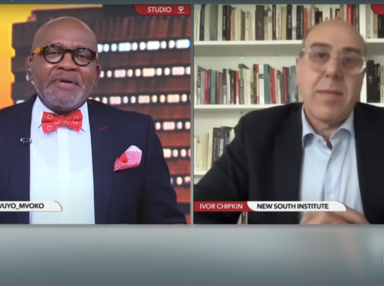Getting to Know NSI: Taibat Lawanson on Urban Dynamics, Governance and Inequalities
Continuing our engaging series, ‘Getting to Know NSI’, we spotlight esteemed contributors to the New South Institute (NSI), providing a deep dive into their experiences and perspectives. This series is a platform where we showcase notable individuals associated with NSI, from board members to affiliated researchers. Our aim is to illuminate why these distinguished individuals find value and purpose in their association with NSI.
In this latest episode, we feature a fascinating discussion between Ivor Chipkin, the Co-Founder and Executive Director of NSI, and Taibat Lawanson, an NSI board member, who brings a unique insight to the table. Our series has previously highlighted the insights of NSI board member Pratap Bhanu Mehta and Distinguished Fellow Radmila Nakarada, further enriching our understanding of urban dynamics, governance, and societal complexities in Africa and beyond.
Taibat, in her capacity as a Professor of Urban Management and Governance at the University of Lagos, Nigeria, leads the Pro-Poor Development Research Cluster. She concurrently serves as Co-Director at the Centre for Housing and Sustainable Development. Taibat’s career-long commitment to understanding and addressing urban realities and spatial justice offers invaluable insight into the complex relationship between societal intricacies and urban life.
Having previously attended our 2022 Architecture of Government virtual conference, Taibat expresses her delight at being part of the NSI. Her enthusiasm stems from the NSI’s dedicated interest in comparative studies and its commitment to promoting learning among countries of the global south. In particular, she praises the NSI’s focus on identifying patterns of governance, finding solutions to challenges, and promoting evidence-based policies for the enhancement of delicate democracies.
Born and raised in Lagos, Taibat possesses an in-depth understanding of the city’s varied landscape, characterized by stark differences in wealth and resource access. She portrays the city as a space of both opportunity and inequality, where extremes of wealth and poverty coexist, and urban access along with resource distribution is riddled with disparity.
She broadens her observations to include the considerable ethnic tensions that lie beneath Lagos’s cosmopolitan facade, influencing political narratives and even shaping electoral results. Furthermore, she sheds light on the enduring impact of Nigeria’s Civil War, including ongoing narratives of decentralization and compensation, which persist in fueling secessionist movements and regional militancy.
When discussing governance, Taibat provides a sophisticated understanding of the challenges facing Lagos. With the lack of effective metropolitan governance systems, Taibat emphasizes a significant rise in spontaneous governance patterns throughout Lagos. These emerge from the urgent needs of communities but lack city-wide standardization. Such governance patterns are often subject to varying influences, further complicating the city’s administrative landscape. It is in this context that she indicates the difficulties in regulating and taxing the significant informal economy in Lagos. This substantial part of the city’s economy often bears an undue burden due to a frail regulatory environment, which also obstructs comprehensive governance.
Nevertheless, Taibat conveys a sense of optimism, highlighting the inherent potential within the civil service – a group of well-educated, technically proficient individuals often constrained more by administrative inefficiencies than by any lack of competence. This viewpoint emphasizes the need for system reform to fully exploit this potential for improved governance.
Lastly, the discussion recognizes the crucial role of social media in contemporary Nigeria. It serves as a platform for public discourse, expressing dissatisfaction, and interacting with political leaders. Taibat stresses its significance in fostering discussions among like-minded individuals, while also accentuating the role of think tanks like NSI in shaping public opinion.
We invite you to watch this enlightening conversation with Taibat Lawanson on YouTube, along with other interviews in our ‘Getting to Know NSI’ series. With her ongoing commitment to advocating spatial justice, Taibat Lawanson’s profound insights act as a testament to her invaluable contributions to NSI and the broader discourse on urban governance. We value the attentiveness and engagement of our audience in these vital dialogues and look forward to your continued interest in the work of the New South Institute.



